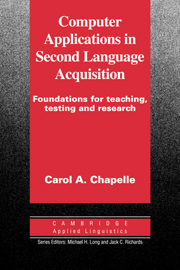Book contents
- Frontmatter
- Contents
- Series editors' preface
- Thanks
- Abbreviations
- 1 Historical foundations of CASLA
- 2 The context and challenge for CASLA
- 3 Computer-assisted language learning
- 4 Computer-assisted language testing
- 5 Computer-assisted SLA research
- 6 Directions for CASLA
- References
- Author index
- Subject index
6 - Directions for CASLA
Published online by Cambridge University Press: 05 October 2012
- Frontmatter
- Contents
- Series editors' preface
- Thanks
- Abbreviations
- 1 Historical foundations of CASLA
- 2 The context and challenge for CASLA
- 3 Computer-assisted language learning
- 4 Computer-assisted language testing
- 5 Computer-assisted SLA research
- 6 Directions for CASLA
- References
- Author index
- Subject index
Summary
The start of the new millennium prompts visions of high-tech solutions to problems in applied linguistics. The past 20 years of research and development in CASLA provide a foundation – if only a fragile one – upon which such solutions might be built. However, past work also clearly demonstrates the need to develop and investigate computer applications from the relevant perspectives in applied linguistics rather than relying solely on work in related fields. To do so it is useful to recognize the overlapping themes running through the three areas discussed in previous chapters. The benefits to be gained through drawing connections among L2 teaching, assessment, and research have begun to be explored in recent volumes in applied linguistics (Bachman & Cohen, 1998; Doughty & Williams, 1998b; Skehan, 1998). The insights offered by these approaches are essential for progress in CASLA because of the need to marshall coherent and detailed professional knowledge to develop, use, and evaluate CASLA tasks. This chapter reviews the shared themes, suggesting how contributions from each area should help to advance knowledge to the benefit of all. Some potential benefits are illustrated through discussion of how software tools might be improved for CASLA.
Overlapping themes
The focus on evaluation issues in the previous chapters pointed to a number of shared perspectives for CALL, CALT, and CASLR. Evaluation of all materials – whether they be for instruction, assessment, or research – is seen as an argument about appropriateness for a particular purpose rather than as a categorical quality judgement.
Information
- Type
- Chapter
- Information
- Computer Applications in Second Language Acquisition , pp. 157 - 175Publisher: Cambridge University PressPrint publication year: 2001
